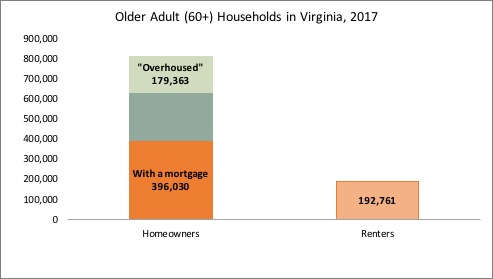Virginia’s “Overhoused” Seniors and Their Impact on the Market
August 8, 2019
By: Virginia REALTORS® Chief Economist, Lisa Sturtevant, PhD
 In many local markets across Virginia, the number of homes for sale is less than half of what it was five years ago. A lack of available inventory is making it increasingly difficult for buyers, including both first-time and move-up buyers, to find housing. One piece of the low inventory puzzle is older adults remaining in their houses longer, either for financial reasons (e.g., a lack of home equity, difficulty finding another affordable home to move into) or because of personal preferences.
In many local markets across Virginia, the number of homes for sale is less than half of what it was five years ago. A lack of available inventory is making it increasingly difficult for buyers, including both first-time and move-up buyers, to find housing. One piece of the low inventory puzzle is older adults remaining in their houses longer, either for financial reasons (e.g., a lack of home equity, difficulty finding another affordable home to move into) or because of personal preferences.
An indicator of this trend is the number of so-called “overhoused” older adults in the Commonwealth. Someone who is potentially “overhoused” is living in a home with more space than they want or desire. It is difficult to predict whether someone lives in “too much house” or simply prefers a lot of space. But as a proxy, data from the U.S. Census Bureau’s American Community Survey (ACS) was used to estimate the number of potentially “overhoused” senior households in the state.
“Overhoused” households are defined as those headed by someone age 60 or older, who owns their home free and clear, and where there are 2 more bedrooms than there are people living in the house. So, a single person living in a 3-bedroom home, or a couple living in a 4-bedroom home, would be defined as “overhoused.”
According to this analysis, nearly half a million older adult households own their home free and clear. And among those, about 180,000 are living in homes that are “too big” for them, by this definition. Therefore, about 43% of older adult homeowners who own their home free and clear are “overhoused” in Virginia. This includes more than 110,000 older adults living alone in homes that have 3 or more bedrooms, and 66,000 older couples living in homes with 4 or more bedrooms.
The places where seniors are most likely to be “overhoused” are in Fairfax and Chesterfield counties. For example, in the McLean, Vienna, and Fair Oaks areas of Fairfax County, nearly two-thirds of seniors who own their homes free and clear are “overhoused.” The share is about the same for older adult homeowners in eastern Chesterfield County.
Many of these older adult homeowners who own their homes outright, of course, prefer to stay in their larger homes and would balk at being called “overhoused.” They may want the extra bedrooms for when the kids come home from college, when visitors come in from out of town, or to set up as a home office. However, some older homeowners do live in a home that is bigger than they want, and they might be staying because of a lack of smaller home choices. This lack of housing choices—resulting from relatively low levels of new home construction since the recession and local obstacles to building smaller homes—creates a bottleneck in some housing markets, limiting inventory for new and move-up buyers, and reducing choices for older homeowners.
You might also like…
Climbing Prices and Mortgage Rates Dampen Virginia’s Spring Housing Market
By Robin Spensieri - April 25, 2024
According to the March 2024 Virginia Home Sales Report released by Virginia REALTORS®, sales activity in Virginia’s housing market slowed down last month. Statewide, there were 8,075 homes sold… Read More
5 Key Takeaways from the NAHREP 2023 State of Hispanic Homeownership Report
By Sejal Naik - April 17, 2024
In March 2024, the National Association of Hispanic Real Estate Professionals (NAHREP) released its 2023 State of Hispanic Homeownership Report. Using data from surveys conducted by various public… Read More
3 Multifamily Market Trends from the First Quarter
By Dominique Fair - April 16, 2024
For the last three years, the multifamily market has seen high demand, double digit rent growth, and increased construction to meet demand. These trends are expected to shift… Read More